For your inspiration: the elements of success
Throughout 2019 we’ve been partnering with our colleagues at the Royal Institution to celebrate International Year of the Periodic Table, marking the 150th anniversary of Dmitri Mendeleev’s lasting legacy.
On Friday 15 November, we joined more than 200 guests from families and school groups, in the Ri’s famous Faraday Theatre, to hear Professor Saiful Islam give a thoroughly entertaining lecture on energy materials, including batteries and perovskites, as well chemistry’s crucial contribution to the fight against the climate emergency.
The lecture was coupled with exhibition stands, experiments and explanations from a dozen university and industry groups and companies, demonstrating the diversity and wealth of chemistry careers to a younger audience.
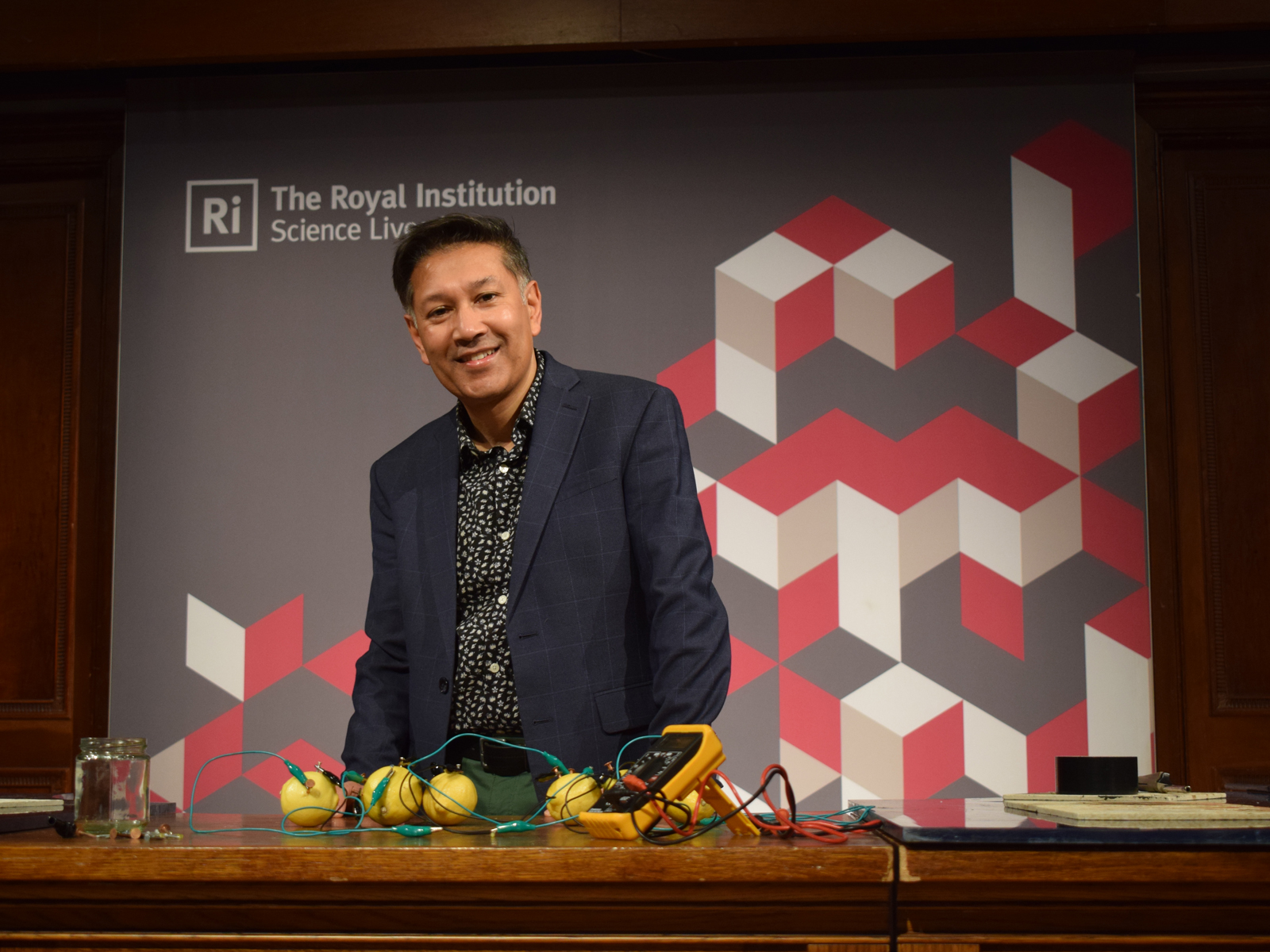
Professor Saiful Islam at the Royal Institution Picture: © Royal Society of Chemistry
Supercharged: making a material difference (with batteries included)
As a former Ri Christmas Lecturer, Saiful told us: “It’s great to be back at the Royal Institution, in this lovely Faraday Theatre. Tonight I’m mainly covering my research area but aimed at a teenage audience, so I’ll be covering Lithium batteries, a bit about solar cells and trying to link it up with some of the elements that we did during my Christmas lectures back in 2016.
“There’s that lovely poster from the Royal Society of Chemistry that says ‘Not all chemists wear white coats’, and I actually show that in the lecture. So that says that it can really open up lots of doors into a range of careers – not necessarily careers that people even think about.
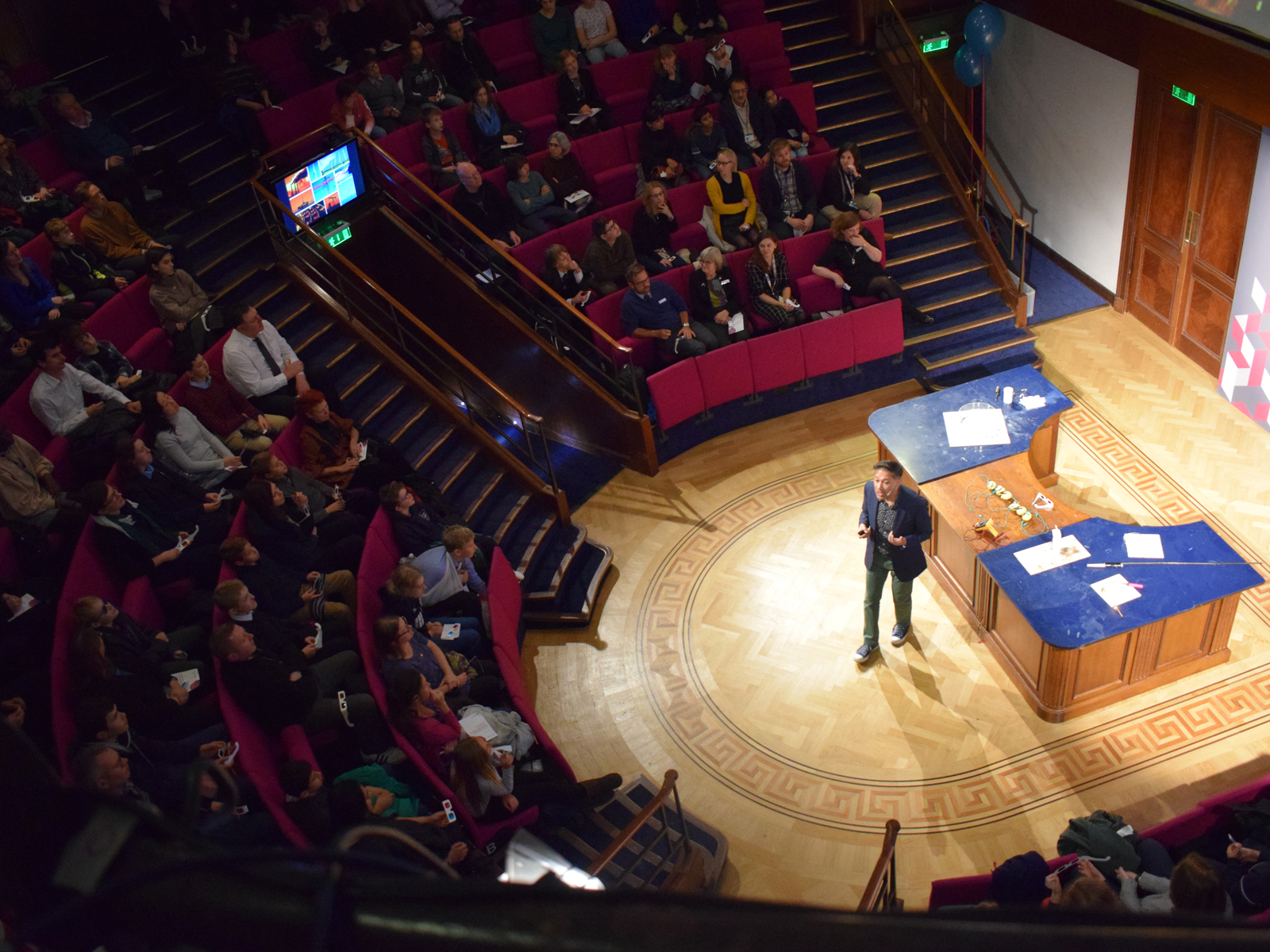
Professor Saiful Islam covered topics from lithium ion batteries to climate change, with a smattering of 80s indie music for good measure Picture: © Royal Society of Chemistry
“If you think about the medical industry, the pharmaceutical industry, the food industry, energy, that I’m very much involved in, is a growing area. And a lot of chemists end up being very analytical and numerate, so they end up in careers that don’t necessarily need science but need those transferable skills.
“I suppose we know that climate change is one of the biggest challenges that we’ve got to deal with this century and science in general – and chemists in particular – can make a really big contribution in trying to deal with that massive challenge. So the title of my talk is “Making a material difference” because materials chemistry is very much part of a lot of those green energy technologies, batteries, fuel cells, solar cells – you name it, a lot of those technologies rely on chemists”.
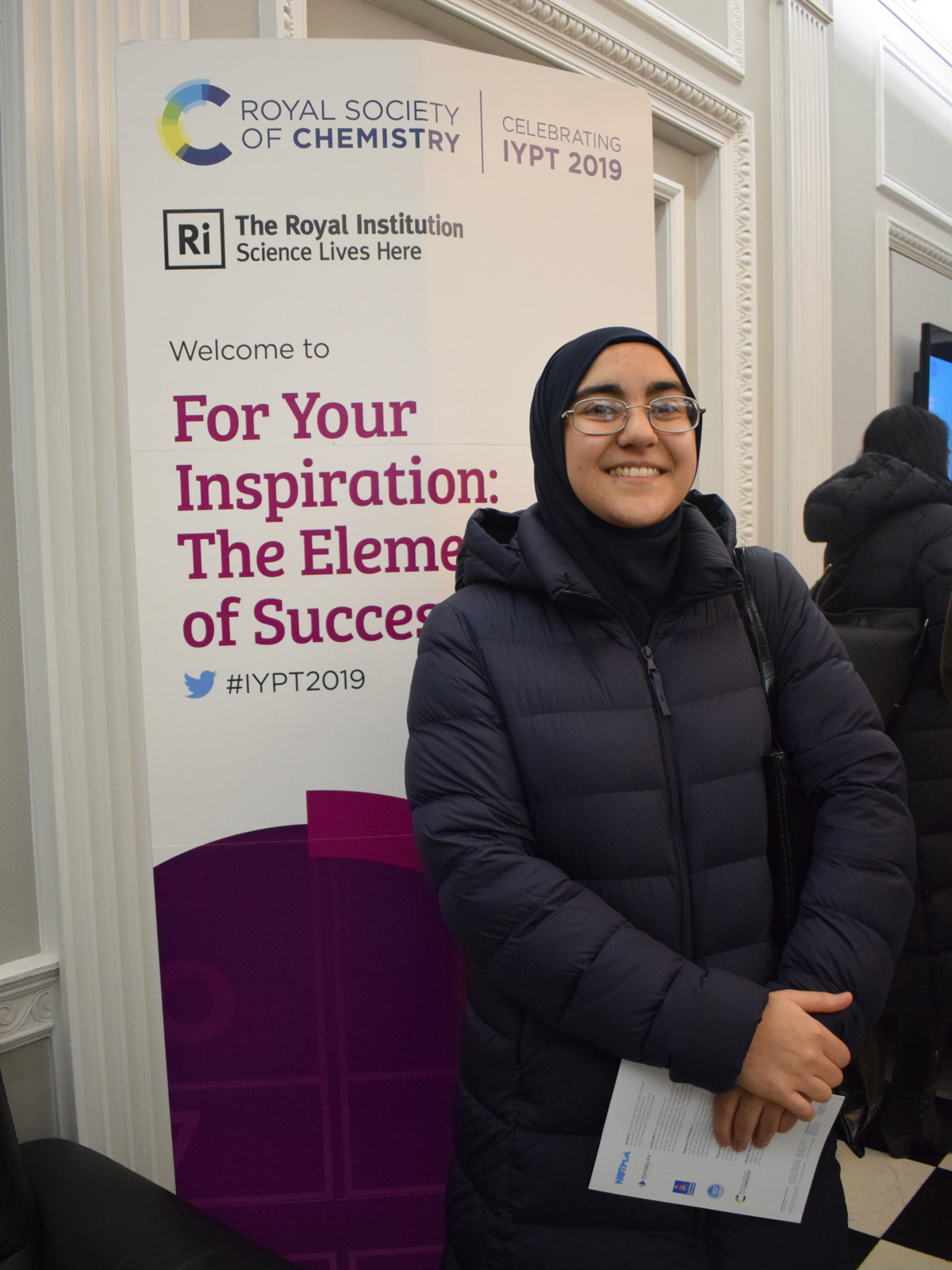
Melike is weighing up her chemistry career options Picture: © Royal Society of Chemistry
Inspiration for a future in chemistry
One of the first people through the doors was Melike, from Haringey 6th Form College, who is studying chemistry, biology and maths A-levels. She explained that, while she knows she wants to study chemistry at a London university, she’s not entirely decided on what career path to follow after that.
She said: “I’m torn, as I kind of want to be a chemistry teacher in future – or go into chemical engineering, though I need to research that aspect a bit more as I don’t know how much engineering is involved.
“I just really, really love chemistry – I went to a UCL lecture a while ago, with Professor Andrea Sella, where he gave an amazing lecture on the properties of water – it was just so spellbinding and I was so caught up in it.
“I love how chemistry is so intertwined in our lives – it’s so everyday – and especially with the changing world, with problems like climate change, I feel like chemistry is at the centre of it. It’s such a human science, which people perhaps don’t think about, but I feel like if we really do want to change the world, it’s going to have to be through chemistry, which is why it’s so important.
“Tonight I’m interested in finding out the ways in which chemistry impacts us that we don’t really think about. For example, on the schedule for tonight I can see Thames Water – they have to clean our water, which takes a whole industrial and chemical process – which is really interesting.
“When I researched chemical engineering, I found it can impact people on a wider scale, from solar power to energy sources, so I want to see how interested I am in that before choosing whether to study straight chemistry and go into a career in teaching – I just want to pursue all my options.”

Alice Taylor, from Oxford PV, explaining the chemistry of perovskites to Hassun from our Public Engagement team Picture: © Royal Society of Chemistry
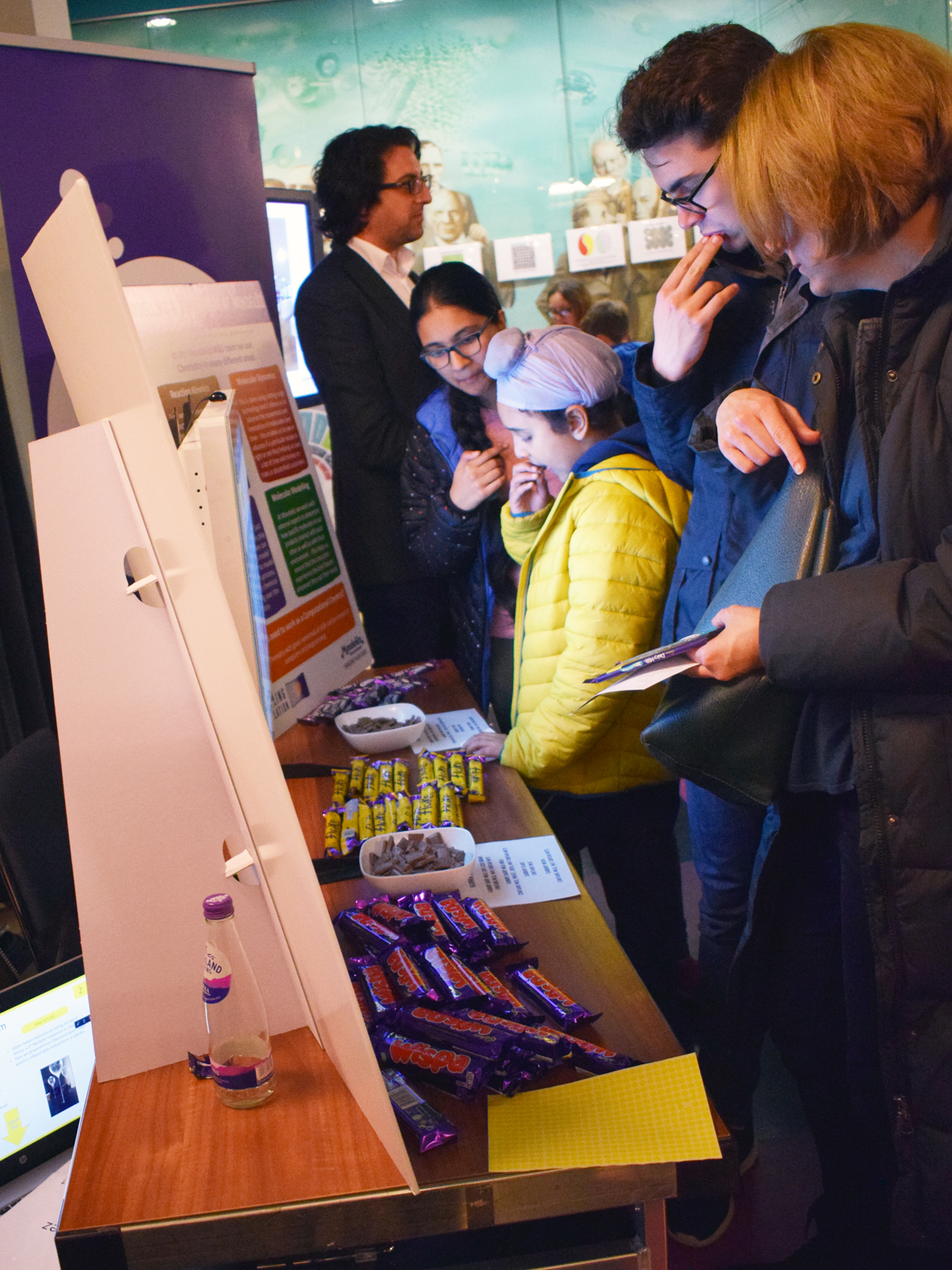
The Mondelēz stand was a popular stop-off, possibly partly thanks to the array of chocolate on hand! Picture: © Royal Society of Chemistry
Communicating complex chemistry
Alice Taylor, from Oxford Photovoltaics enjoyed the experience of talking to a different type of audience, specifically adapting her explanations for teenagers. She said: “It’s really great. There are some kids who are getting really excited about chemistry and I think it’s quite shocking to some of them to understand the ways in which that can relate to the real world, to innovation, to products that will be changing their future. It’s really great for them to have this opportunity to see that in action.”
Jenny Tompkins and Robert Cordina, from Mondelēz, explain that it’s the first time they’ve worked on an exhibition stand with a teenage audience. Jenny said: “It’s really refreshing. We’ve seen a lot of people who are passionate about chemistry from a really young age. It is really nice to see that they’re actively engaging in things and asking questions, being inquisitive about how you can use it.
Robert added: “What I’ve enjoyed is that children are actively interested in chemistry, that they’ve discovered that there’s a lot of chemistry in food and that they can have a career in food chemistry – which is what we’re trying to do here. As a teenager I definitely didn’t know you could work in food chemistry – I was set on working in pharmaceuticals as the link to chemistry was a bit more obvious. It was something I discovered much later, when I had already graduated.
“I’m on the Food Group Committee at the RSC – I love food and I love chemistry so, to me, working in food chemistry is the best thing ever. Because I love food so much, I believe I enjoy my job so much more than when I used to work in pharmaceuticals.
“My advice on careers choices is that, if they enjoy studying chemistry, they should continue, as there’s a lot of options of different industries, apart from academia, even in industries that they wouldn’t probably think need chemists, such as food.”
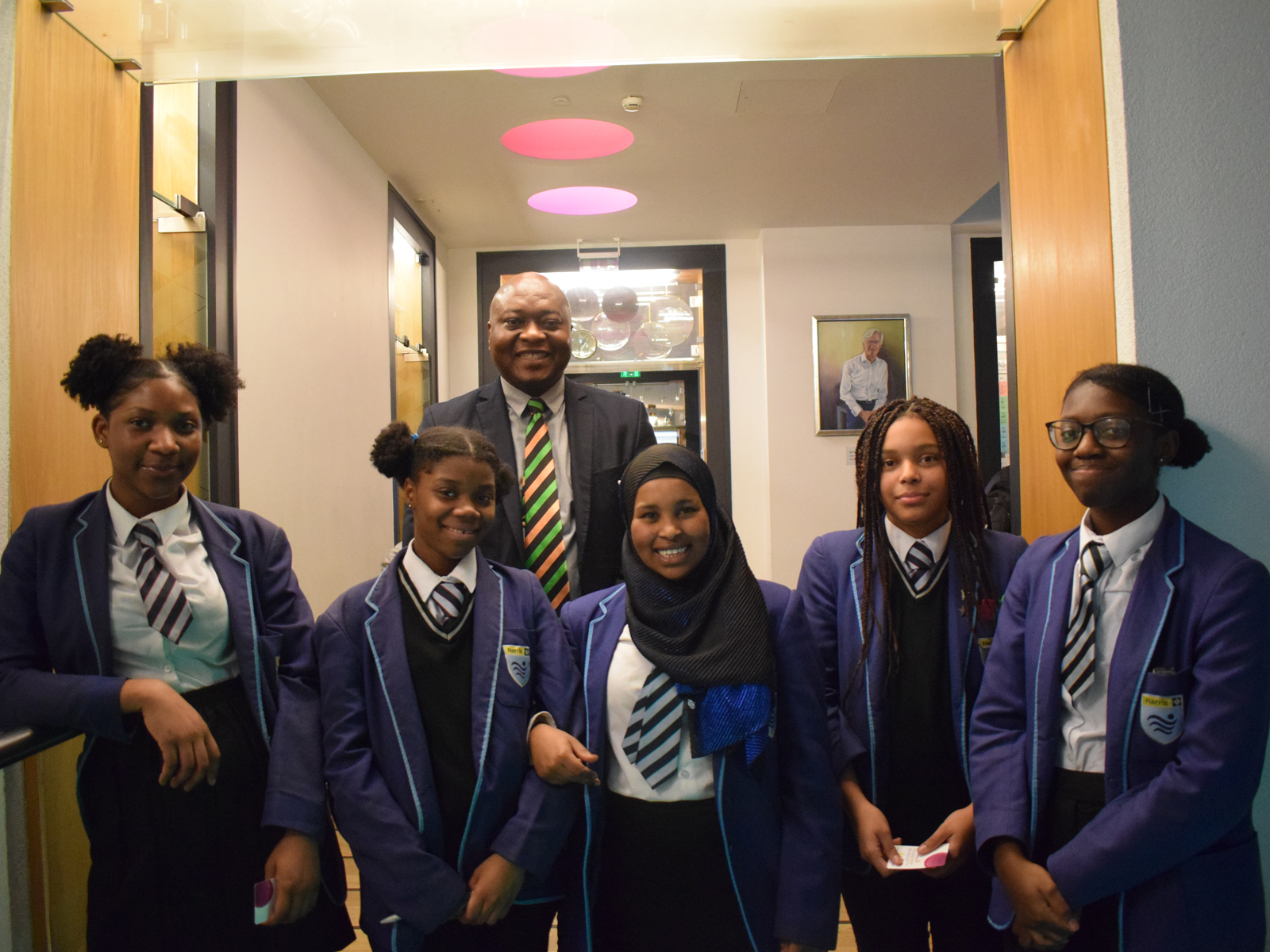
Students from Harris Academy in Peckham Picture: © Royal Society of Chemistry
So what did people get out of attending?
After the main lecture, the younger members of the audience took the chance to learn about the huge range of chemistry careers that could await them. There were stands from across industry and academia, including AstraZeneca, paint experts Sherwin Williams, Thames Water and (the extremely popular) chocolatiers from Mondelēz. On the university front, there were demonstrations of soalr cells and perovskites from OxfordPV, Warwick University’s Elements for Life team and a collaborative team of chemists and engineers from the Universities of Nottingham, Bristol and Southampton, under their joint project Green Light For Chemistry.
Hani from Harris Academy in Peckham attended the lecture with four of her classmates. She said: “It’s said that women aren’t really interested in some subjects, so I wanted to check out what it was really about. Today’s talk was actually really good – I thought that chemistry people were just in labs, so Saiful said he does computer modelling, I didn’t know chemistry could do that, which is actually really interesting and I found it really helpful. I can see chemistry in a different way – instead of just lessons and doing practicals.”
Former England Rugby Union international Jason Leonard is a regular attendee at Royal Institution events, with his son, who’s hugely interested in science. Jason said: “It’s been very cool – today’s event is probably the most-attended one I’ve come to. I think changing the age of it has been a success in that aspect, and I always come away learning something, so I’ve thoroughly enjoyed it.
“It’s not just the science side of it – it’s the history of it and I think the boys and girls in the room today hearing about Michael Faraday and pioneers in that aspect, which I sometimes think is just as important, to see what we’re doing now but where it came from and how it originated. I think it’s very important.”
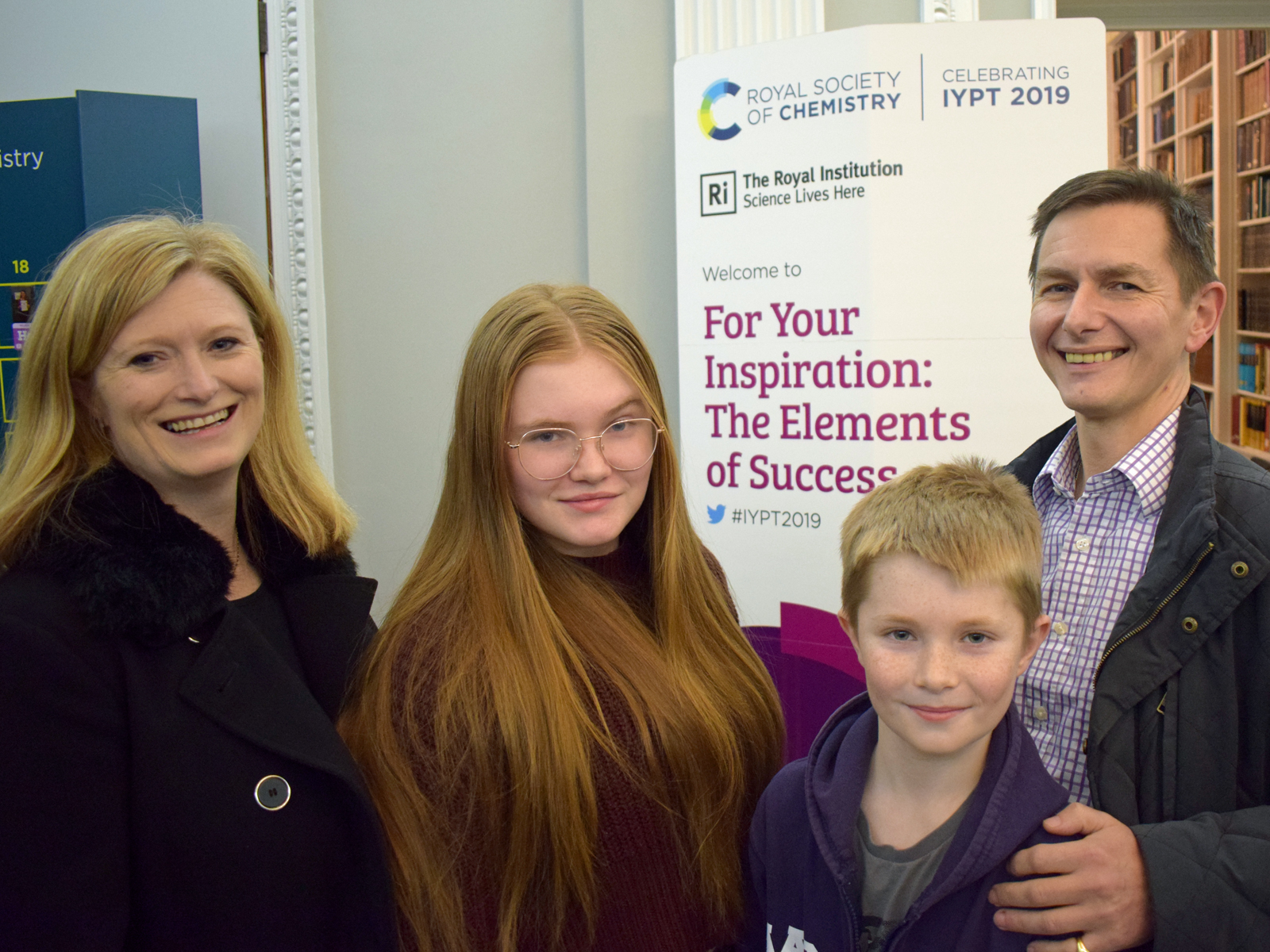
RSC Trustee Louise Armstrong-Denby and her family are regulars at Royal Institution events Picture: © Royal Society of Chemistry
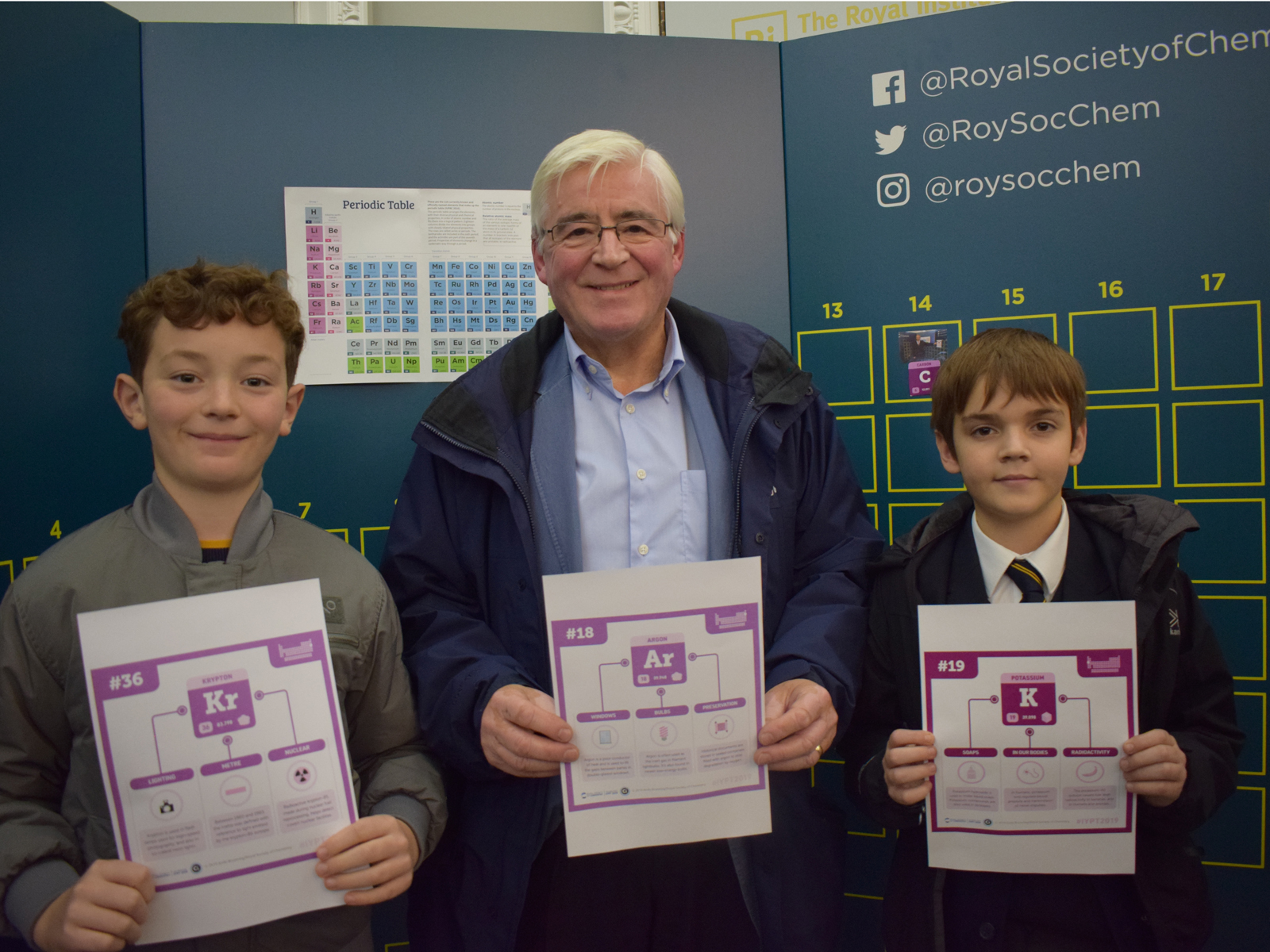
RSC Trustee Geoff Maitland, with his grandsons Stanley and Tom, keeping up the family scientific tradition Picture: © Royal Society of Chemistry
Family matters…
Two members of our Board of Trustees brought members of their families along for the evening. Professor Geoff Maitland, of Imperial College London, brought his two grandsons, Tom and Stanley to watch Saiful’s talk. He said: “Events like this are absolutely essential and inspirational, because it gets the variety of chemistry in front of young people, and how particular elements have made an impact, not only on the way we live life today but the way it’s going to change the future – and that is inspirational for young people”.
A passion for science clearly runs in the Maitland family genes, with Tom saying: “I’m really interested in chemistry – I like looking at the periodic table and seeing how the different things work together. I enjoyed [the lecture], I liked the experiments and the talk about the lithium batteries.”
Stanley added: “I like to learn about when people start things, inventing new things that people haven’t done before, so if someone came up with a new element in the periodic table, I would find that really interesting.”
Louise Armstrong-Denby, another of our Trustees, is Chief Commercial Officer of cancer diagnostics specialists Visiopharm. She said: “I think it’s been a fantastic opportunity to bring the children along and actually get them engaged in chemistry. They love science at school, and one of them is a member here at the Royal Institution and has been to the Christmas Lectures.
“For them, today, it’s allowed them to see what chemistry is all about. They don’t really equate their Mum with chemistry, so coming here – and talking to lots of interesting people and seeing how chemistry appears in lots of different parts of life – has been so rewarding for us, and for me as a parent, to share it with the children, as I don’t get to see how they interact with science at school.
“Sustainability is a topic that’s very hot on their radars, it’s a topic the bring up from what’s happening at school – the conversations about plastics and the whole environmental impact – it’s a very important message.”
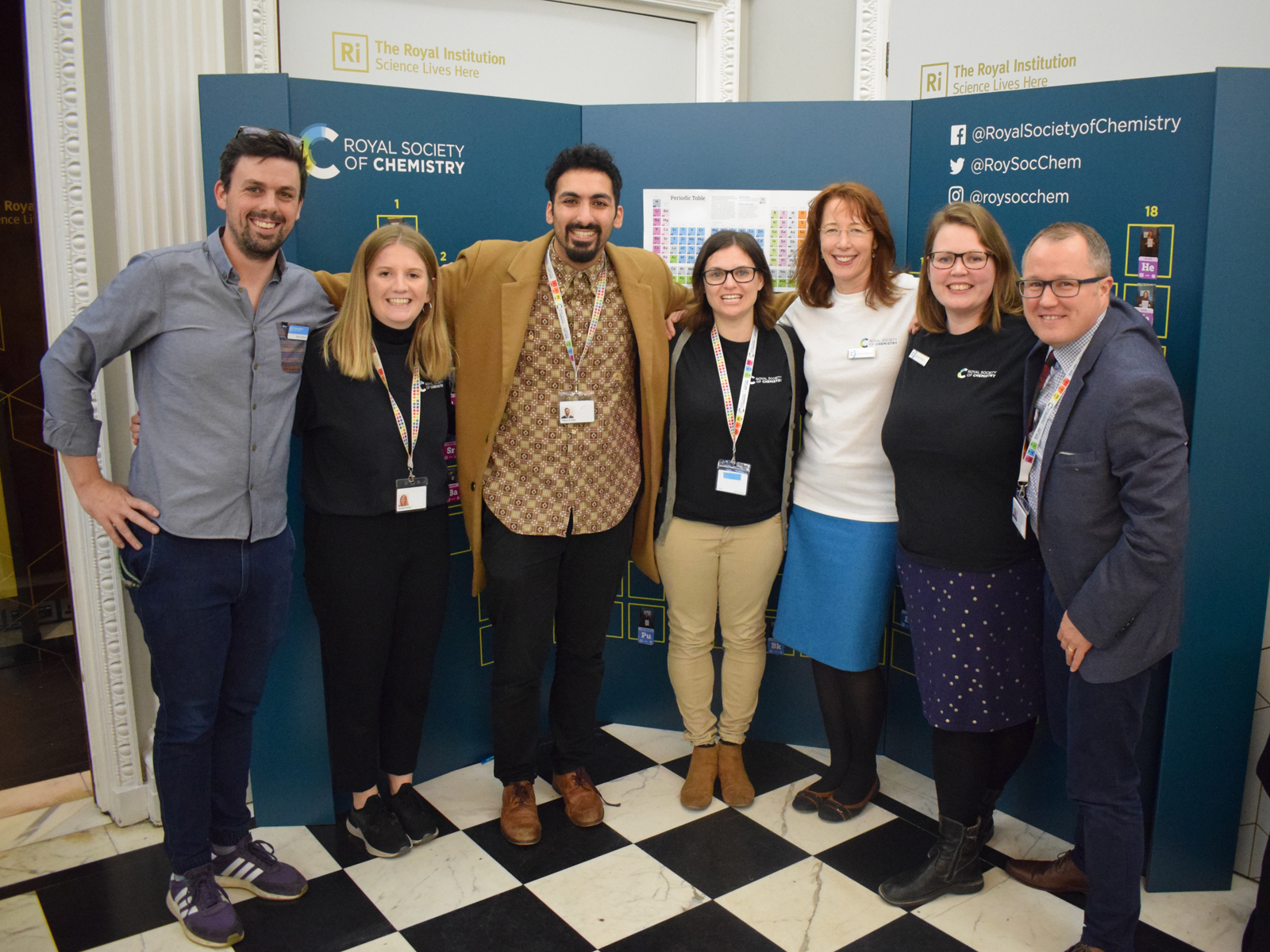
Some of the Ri and RSC team who organised the event! Picture: © Royal Society of Chemistry